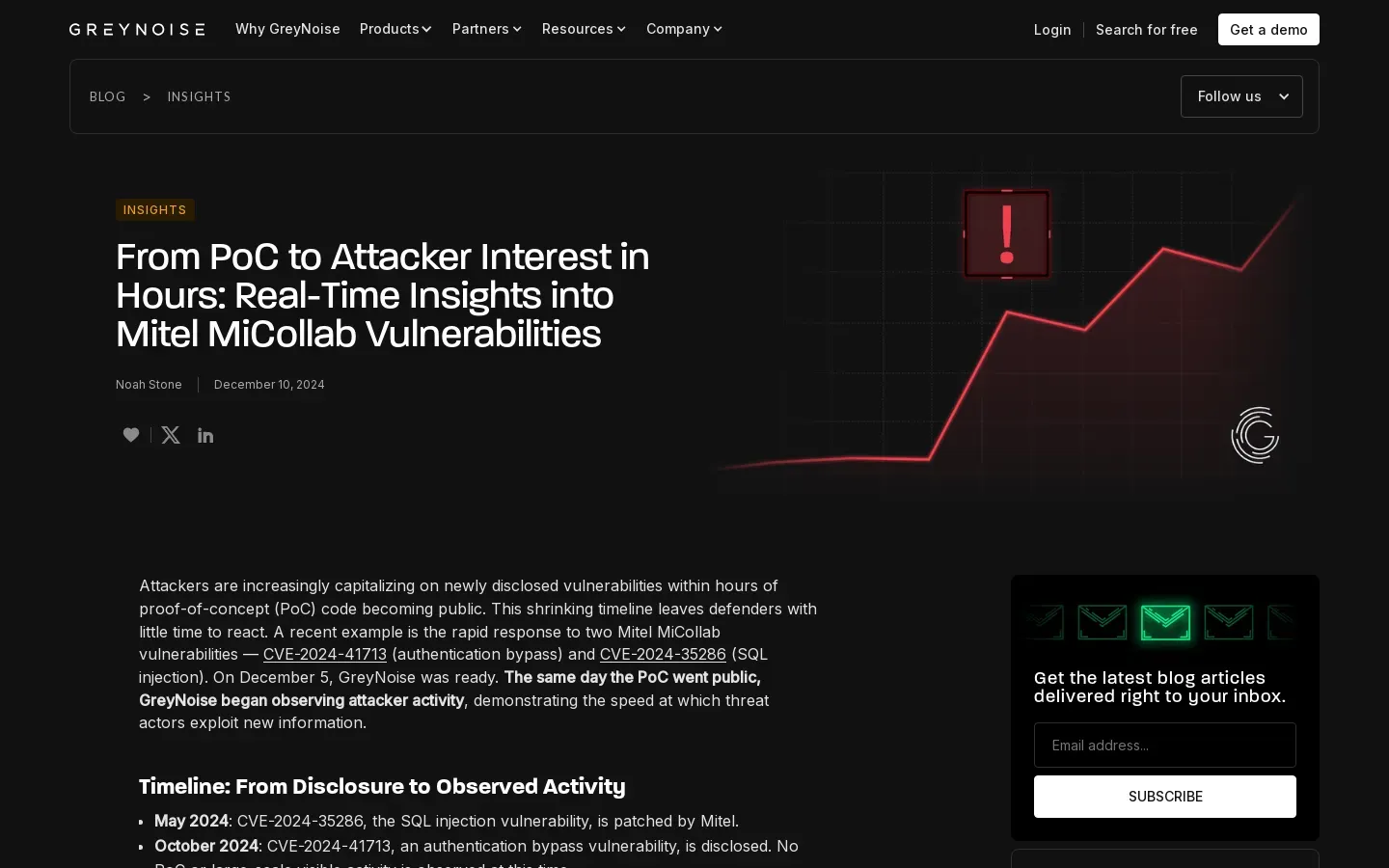
Attackers Exploit Vulnerabilities in Mitel MiCollab Software
/ 3 min read
Quick take - GreyNoise has reported that attackers are quickly exploiting newly disclosed vulnerabilities in Mitel’s MiCollab software, highlighting the urgent need for organizations to implement proactive cybersecurity measures and apply available patches.
Fast Facts
- Attackers are quickly exploiting newly disclosed vulnerabilities in Mitel’s MiCollab software, specifically CVE-2024-41713 (authentication bypass) and CVE-2024-35286 (SQL injection).
- Proof of Concept (PoC) code for CVE-2024-41713 was released on December 5, 2024, with immediate attacker activity observed the same day.
- The rapid exploitation of these vulnerabilities highlights the urgent need for organizations to implement real-time threat intelligence and enhance defensive strategies.
- While CVE-2024-35286 has seen limited activity, organizations must remain vigilant as future exploitation risks persist.
- Mitel has released patches for both vulnerabilities, emphasizing the importance of prompt application to safeguard against potential attacks.
Cybersecurity Alert: Attackers Exploit Newly Disclosed Vulnerabilities in Mitel Software
In a stark reminder of the ever-evolving cybersecurity landscape, attackers have swiftly moved to exploit newly disclosed vulnerabilities in Mitel’s MiCollab software. According to GreyNoise, a cybersecurity intelligence firm, these vulnerabilities—CVE-2024-41713 and CVE-2024-35286—pose significant risks to organizations using the affected software.
Immediate Exploitation of Vulnerabilities
The timeline of these events is particularly concerning. Proof of Concept (PoC) code for CVE-2024-41713, an authentication bypass flaw, was released on December 5, 2024. Alarmingly, GreyNoise reported that malicious actors began exploiting this vulnerability on the very same day. This rapid exploitation underscores a troubling trend where attackers are increasingly quick to leverage newly disclosed vulnerabilities, leaving defenders with minimal time to respond.
Technical Details and Implications
CVE-2024-41713 allows attackers to bypass authentication mechanisms, potentially granting unauthorized access to sensitive systems. Meanwhile, CVE-2024-35286 is a SQL injection vulnerability that could enable attackers to manipulate databases and extract confidential information. While activity surrounding CVE-2024-35286 has been limited so far, the potential for future exploitation remains high.
These vulnerabilities highlight the critical need for organizations to adopt real-time threat intelligence and enhance their defensive strategies. The swift exploitation of CVE-2024-41713 serves as a wake-up call for cybersecurity teams to prioritize visibility and immediate mitigation efforts upon disclosure of such vulnerabilities.
Mitigation and Defensive Measures
In response to these threats, Mitel has promptly released patches addressing both vulnerabilities. Organizations using MiCollab software are strongly advised to apply these updates without delay to safeguard against potential attacks. The release of patches is a crucial step in mitigating risk, but it also emphasizes the importance of maintaining an up-to-date security posture.
The Path Forward
As cyber threats continue to evolve at an unprecedented pace, organizations must remain vigilant and proactive in their defense strategies. Continuous monitoring for signs of attack escalation is essential, even when initial activity appears limited. By staying informed and enhancing their defensive postures, organizations can better protect themselves against rapidly evolving threats.
In this dynamic cybersecurity environment, preparedness and swift action are more critical than ever. Organizations are urged to stay abreast of developments and implement robust security measures to mitigate risks associated with newly disclosed vulnerabilities.



